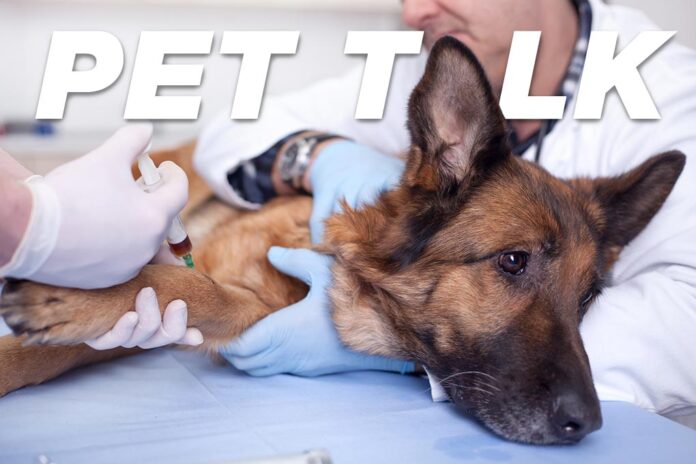Part 1:
I’d like to take this perfect opportunity in our current state of Coronavirus vaccination in humans to discuss vaccinations and immunity in cats and dogs. If you own a cat or dog, it’s very likely that without hesitation, your pet received a set of initial vaccines as a puppy or kitten, and then a booster vaccine every year throughout their life. But is this annual protocol necessary?
Let’s talk about immunity!
Animals receive antibodies from their mothers while still in the womb. This is called maternal or passive antibodies. Although some variances can occur, such as the health of the mom and what antibodies she naturally possessed, puppies and kittens are born protected from all the diseases the mom had antibodies for.
For example, a healthy, pregnant female that had proven immunity against Parvovirus, Distemper and Rabies, some of the major diseases deadly diseases we vaccinate our dogs for, will pass on this immunity to her pups while she is pregnant. So, when the puppy is born, it is protected, but for how long?
We know that it takes the immune system somewhere between 8-24 weeks to fully mature. This is a pretty large variance, and has much to do with genetics as well as environment, where it lives, what it’s exposed to and so much more.
Ideally, the first vaccination would be given just before the maternal antibodies are completely gone and before exposure to disease. But when is this? Conventional vaccine protocol was put in place in the late 1970s to protect our pets, and today it is believed by traditional methods to begin vaccinations between 6-8 weeks, again at 12 weeks and then at 16 weeks of age.
It is also known that giving a vaccination while maternal antibodies are present, the vaccine is blocked and little, if any immunity will develop.
According to many experts, including Dr. Peter Dobias, DVM, it is believed that the following can occur in an immature immune system:
- The vaccine will not trigger the production of antibodies because the immune system is too immature.
- The vaccine can destroy the maternal antibodies, thus leaving the pet less protected.
- Boosters have proven unnecessary, as most dogs remain protected after only one vaccination.
According to Dr. Dobias, it is strongly believed that immunity in dogs and cats lasts a lifetime after just one vaccine. Dr. Ronald D. Schultz, Professor and Chair at the School of Veterinary Medicine, University of Wisconsin-Madison, studied immunity in dogs because he believed “little or no research has been done to demonstrate that the practice of annual revaccination has any scientific value in providing greater immunity than would be present if an animal was never revaccinated or was revaccinated at intervals longer than a year”
He went on to say “furthermore, we have found that annual re-vaccination, with the vaccines that provide long-term immunity, provides no demonstrable benefit and may increase the risk for adverse reactions.”
I worked in the veterinary field in the 1980s and saw firsthand the havoc and heartbreak that Parvo Virus had on dogs and puppies. I watched hundreds die, and it affected and shaped me in a way I didn’t fully understand until later. If there was ever a person that was pro-vaccine for pets, particularly for that disease, it was me. I firmly believe we need to understand how the body works and how and when and when not to use vaccines with our pets.
This article was not written to induce fear of vaccines, nor, to discredit their importance in the role of immunity. In preparing for this writing, it became clear that not only was this likely the most relevant and most important article I’ve written for this column, but that I would not be able to present this topic in just this month’s space. I invite you to continue reading on my website for the full article, or, to look for “Part 2” in the May issue.
Until then, I wish you and your pets lots of health and happiness in the days ahead!
Part 2:
In Vaccines and Immunity: Part 1, I spoke about how the immune system is “inherited,” from the mother to the offspring. I also cited evidence that we may very well be over-vaccinating our beloved pets, even after a study in 1998 by Dr. Ronald D. Schultz found that annual boosters have not proven to be necessary in many cases. If what Dr. Ronald D. Schultz’ study on dogs found is correct, it is possible that immunity develops earlier on than originally believed and that vaccinating on a yearly or even every three-year basis, may lead to more harm than good.
In the 1990’s I learned about vaccinosis. Vaccinosis is the chronic illness that vaccination may cause. “Signs and symptoms are variable and include itchy skin, warts, allergies, digestive problems, cardiovascular disease, cancer, epilepsy, or mental/emotional problems” according to Dr. Jane Laura Doyle, DVM. “Dogs who have shown signs and symptoms after a vaccination often repeat the same illness when vaccinated again” she said.
I learned about vaccinosis when I was dealing with a sick adult cat in the mid-90’s. Sophie was a 5-year-old rescue and developed chronic diarrhea and was generally declining. With my background working as a veterinary assistant for many years, I wouldn’t have ever considered vaccines to be the root cause of her condition. I had recently moved back to Oregon and found a new, holistic vet to examine Sophie and what I learned on that visit shattered what I thought about vaccines and immunology. My new veterinarian spoke about vaccinosis. This was my first “lesson” about the harm that overly-vaccinating can cause. She said that the decline is generally never associated with vaccines because the onset can be a few weeks or months after the vaccine.
I admit, I wasn’t convinced. In fact, it took me months to trust and be comfortable with stopping Sophie’s vaccine protocol. It took me later to realize that the vaccines she was given before I adopted her, and the ones I later gave her, were likely the root cause of the issues she later developed. Sophie’s symptoms persisted for years, and although she lived a very long life, I wasn’t happy with her quality of health.
Not every pet will have ill side-effects from their vaccine. So, my story will not be everyone’s story. And thank goodness! However, I strongly believe that we may be doing more harm than good when we are inoculating our pets.
If not vaccines, what?
With the goal of a healthy pet with a strong immunity against major disease, and learning that the very vaccine protocol we’ve been doing may be doing more harm than good, what do we do?
My holistic vet in the 1990’s taught me about titer testing. Titer testing, simplified, is a blood test that measures the level of antibodies a pet has to various diseases. If a pet has adequate antibodies for a specific disease, they have immunity for that disease at that snapshot in time. If their antibody levels are low, they are considered at risk and may likely need a booster vaccine.
Fast forward to 10 years ago when I adopted my dog Willa. Willa’s mom and her entire litter developed Parvo Virus, the very virus I watched hundreds of dogs and puppies succumb to when I worked as a vet assistant in the 1980’s. Knowing Willa battled this disease and survive gave me good reason to believe that she had developed immunity, thus possibly never needing the vaccine. Sadly, she did receive the first booster from the shelter. In addition, that booster was given while she had Parvo Virus and she also was spayed, all before being 8 weeks old.
The trauma to her body and immune system went through is more than any puppy should endure. I opted to not give her anymore vaccines as a puppy, so, when she was “due” for her annual booster at one year of age, I requested a titer test instead. My veterinarian was completely understanding! She explained that this was abnormal, and more expensive than just giving her the vaccine, but she completely understood. This began my long, and supportive relationship with my vet that still treats my pets to this day.
As expected, the titer test revealed complete immunity. In fact, her antibody levels were so high, I wondered if she would ever need the vaccine again. I waited three years, did the titer test again, and yes, she was still very much immune. I also titer test for Rabies Virus, which she has shown 100% immunity after only one vaccine at one year of age.
With vaccination being such a big topic these days, I wanted to draw the attention to what this means for our pets. I believe being educated about immunity, and how to use titre testing to measure for immunity, is the safest, most scientific approach we could take.
It is my hope that titer testing become the gold standard before blanket vaccination and that vaccinations are done when, and if, they are needed. I know this would require a big shift in perspective in the veterinary community, however, I feel so strongly about this that I will continue educating and advocating for as long as it takes.
References:
Dr. Jane Laura Doyle, DVM The Vaccination Dilemma And Vaccinosis, Dogs Naturally, March 5, 2014
Schultz, R.D. Current and Future Canine and feline vaccination programs. Vet Med 3: No. 3, 233-254, 1998.
Stronger Immunity and Fewer Vaccines for Puppies and Adult Dogs by Peter Dobias, DVM























